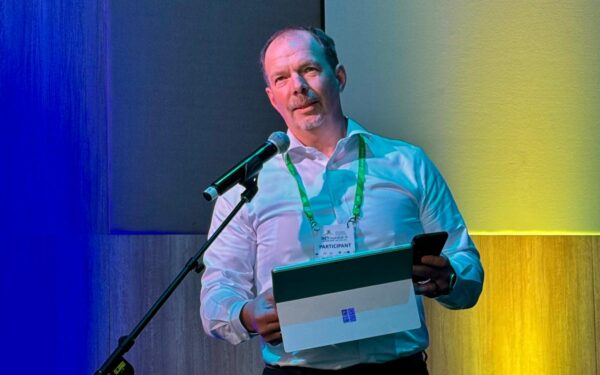This week, CIRA is in Iqaluit, NU to meet with local internet stakeholders and discuss the creation of an Internet Exchange Point to improve internet speed, performance and security in the community.
I live and work on the internet – and not just because I’m CIRA’s Chief Technology Officer (CTO). My digital life isn’t that different than most Canadian office workers’. Canada’s Internet Factbook, which CIRA produces annually, shows 71 per cent of Canadians spend three hours or more online each day. That’s easily done when you think about time spent reading and responding to emails, or doing research at work; and in off-work hours, tackling your banking, buying those latest concert tickets, or keeping up with peers and the latest industry news on social media. Add to that streaming television or radio, and it has become almost impossible to disconnect. At least, for those of us in Canada’s south.
This week, CIRA is in Iqaluit, NU to meet with local internet stakeholders and discuss the creation of an Internet Exchange Point to improve internet speed, performance and security in the community (a topic I first wrote about this spring). In the coming days, I’ll be writing about the outcomes of these meetings. But that means nothing without understanding the impact a better internet could have on actual citizens, and their ability to participate in our digital economy and gain access to the same knowledge and services as residents in the rest of the country.
Price for quality out of balance with rest of country
Take, for example, Iqaluit resident Aaron Watson. The father of two has changed internet service providers multiple times over the years in an effort to find a stable connection with enough speed to do basic online tasks, at what he calls an affordable rate.
At one point, he had signed up for a plan that was $180 a month for 60GB at 5 mbps (though he often couldn’t achieve those speeds). Yet it wasn’t rare for him to get $600 bills some months, driven in large part by data usage overages he says he couldn’t quite trust. His current plan offers 100GB for $140, and he’s supposed to get speeds of 8 mbps – but he says he really only gets those speeds when most other users in the city are asleep.
Forget a subscription to Netflix, he says. He struggles with basic online tasks like sending or receiving emails with PDF attachments, and the cost of this service adds up to a good chunk of many Canadian households’ monthly budget.
Ottawa-based doctor Shawn Ziai witnessed first-hand the ramifications of poor internet connectivity in Nunavut during a recent rotation in the territory’s capital. He said limited access to quality internet in Iqaluit and in remote communities makes medical professional jobs that much harder. While communities have adopted some new technologies, they simply aren’t used to their fullest. Ziai uses the example of Skype being used for consultation, but slow internet means it isn’t in real time, making communications difficult.
“I think they are using the internet to the best of their ability right now and faster internet will bring them up to speed,” he says.
Poor internet impacts every area of society
Iqaluit mayor Madeleine Redfern notes all the ways the internet affects residents in her city including limiting their contact with friends and family and slowing work productivity. It also reduces access to education, health care, culture and social services and it stalls innovation and economic development.
“Imagine doing basic online tasks at work – but each one takes you three to five times longer because your internet connection is so slow and limited,” she says, pointing out that in an increasingly cloud-based digital economy, productivity is affected.
As is innovation, and the development of the next generation of IT professionals.
“Most of our kids don’t want to go into tech – because tech sure isn’t fun when you’re on old technology, it’s slow and you can’t even do most of what it’s supposed to do,” she says.
She points out that there have been some bright spots, such as the Cisco Connecting North program which connects Nunavut schools to online education or health care services using technology. But she says there is so much work to do still.
Redfern is exploring various partnerships, programs and ideas to improve the internet across Canada’s north. In seeking solutions, she suggests that governments and other stakeholders look elsewhere than within our own borders.
“We can’t have large parts of our country inadequately connected and not concern ourselves why. There is a long-standing prejudice that exists between southern and northern standards and investments including in infrastructure but also in telecommunication. When there is such massive and blatant digital disparity between northerners, most of whom are indigenous. Iceland is almost 100 per cent connected. Greenland is doing way better than us, as is Alaska. Let’s stop only looking south, and also look at what we can learn from our Arctic neighbours who have overcome some of the challenges we’re still dealing with” says Redfern.
As an expert in developing innovative, leading-edge IT solutions, Jacques has established CIRA as a global leader among ccTLD registries. He has 25+ years of experience in the private and not-for-profit sectors and as CIRA’s CTO,is currently leading CIRA Labs, CIRA’s innovation hub and providing leadership and direction for the management and security of the .CA registry and its underlying DNS.
A visionary in the Internet community, Jacques led the development of CIRA’s Internet Performance Test, is an outspoken advocate for the adoption of IPv6 and represents the .CA registry internationally as a member of a variety of working groups and advisory groups. He is committed to the development of a new Canadian Internet architecture. He has served as the catalyst for the creation of a national Canadian IXP association, CA-IX, and is a member of the Manitoba Internet Exchange’s (MBIX) and the DNS-OARC Board of Directors. Jacques is also a member of ICANN’s Security and Stability Advisory Committee (SSAC).
Jacques holds an Electronics Engineering Technologist diploma from Algonquin College, is ITIL v3 Foundation certified and is a certified Agile ScrumMaster.





